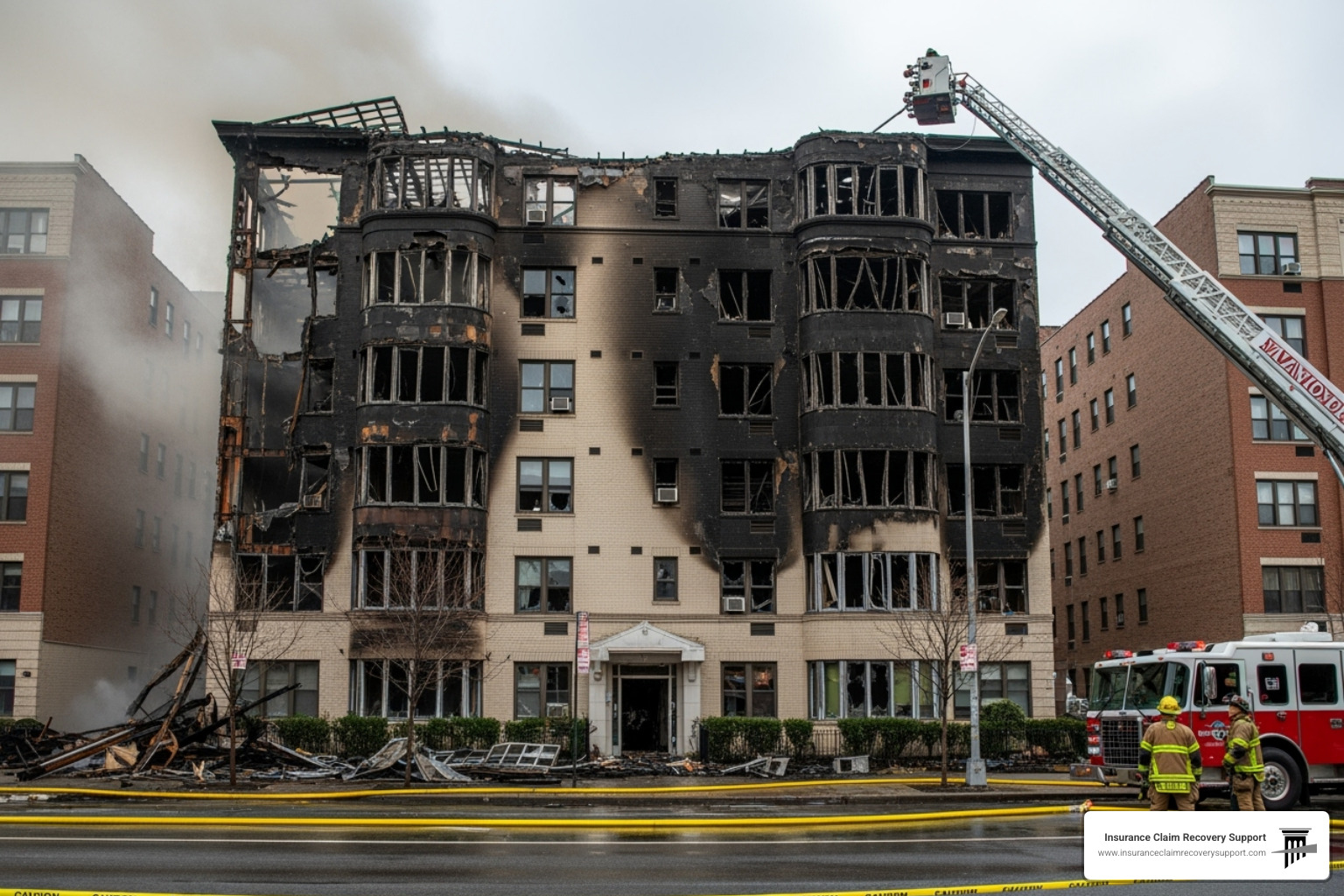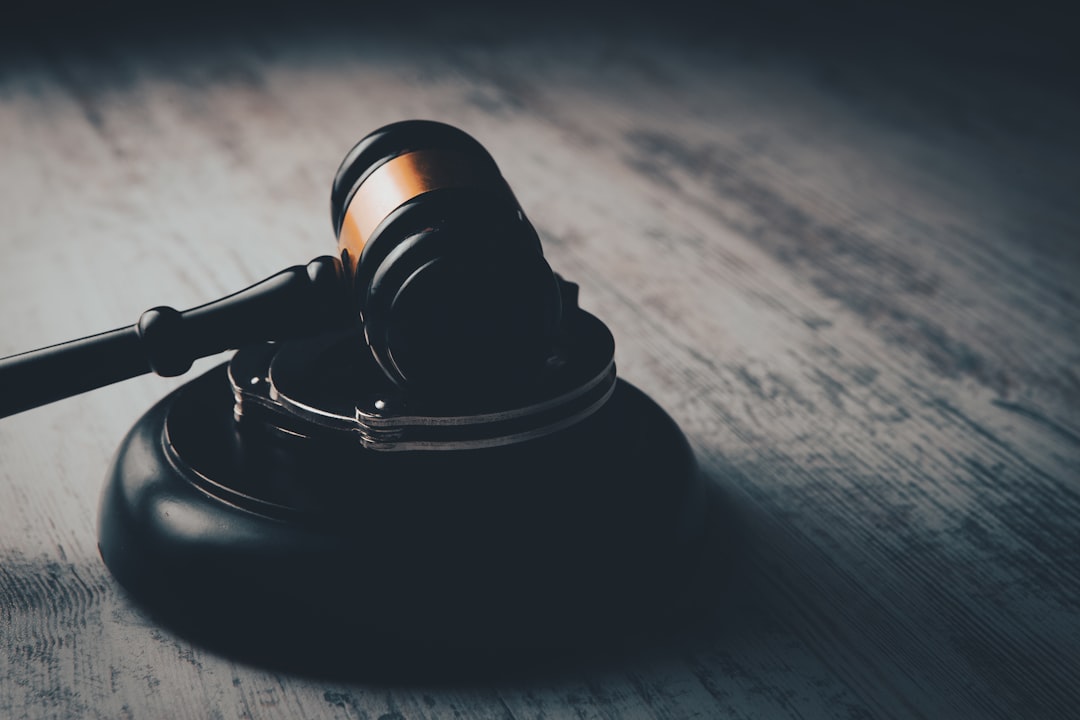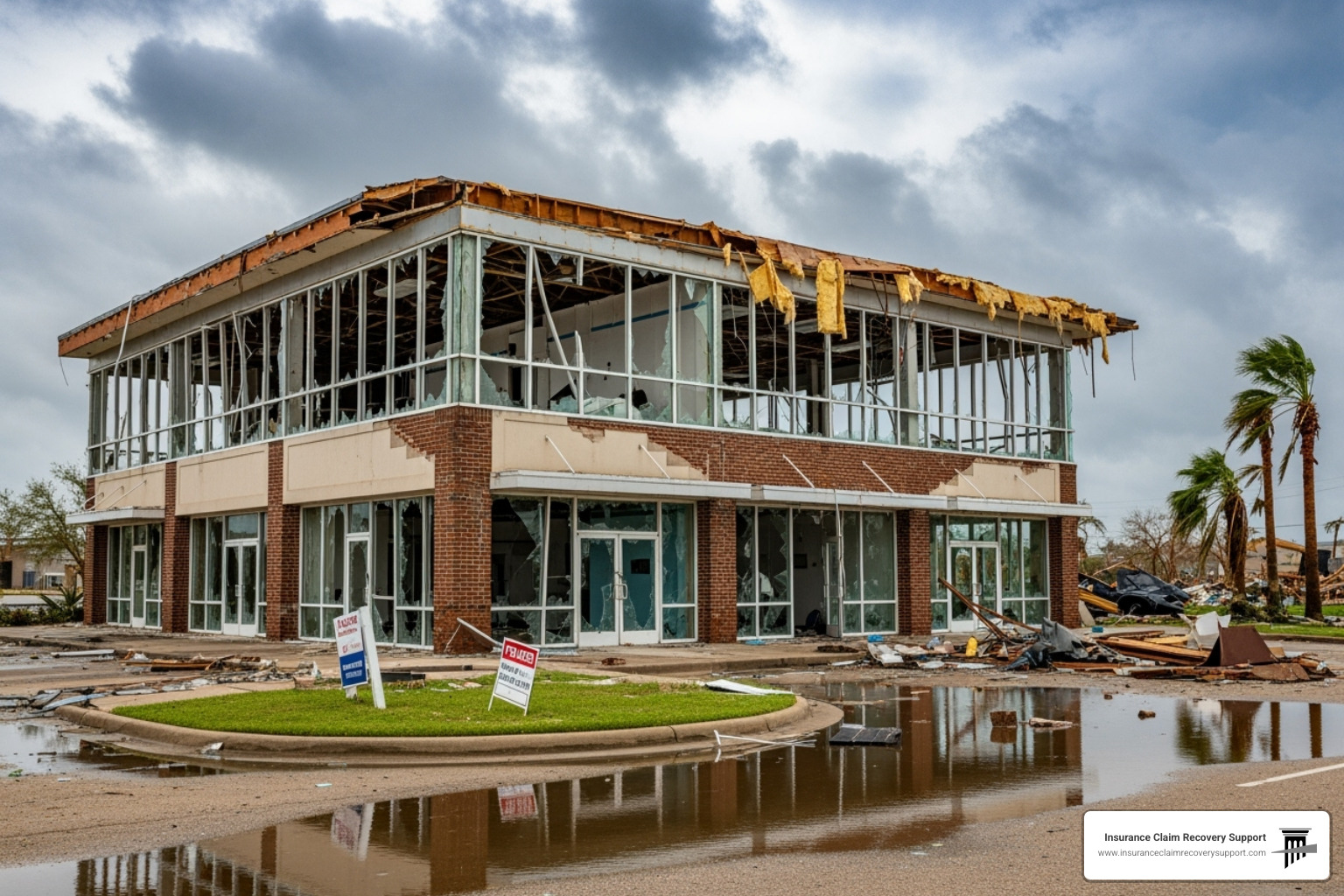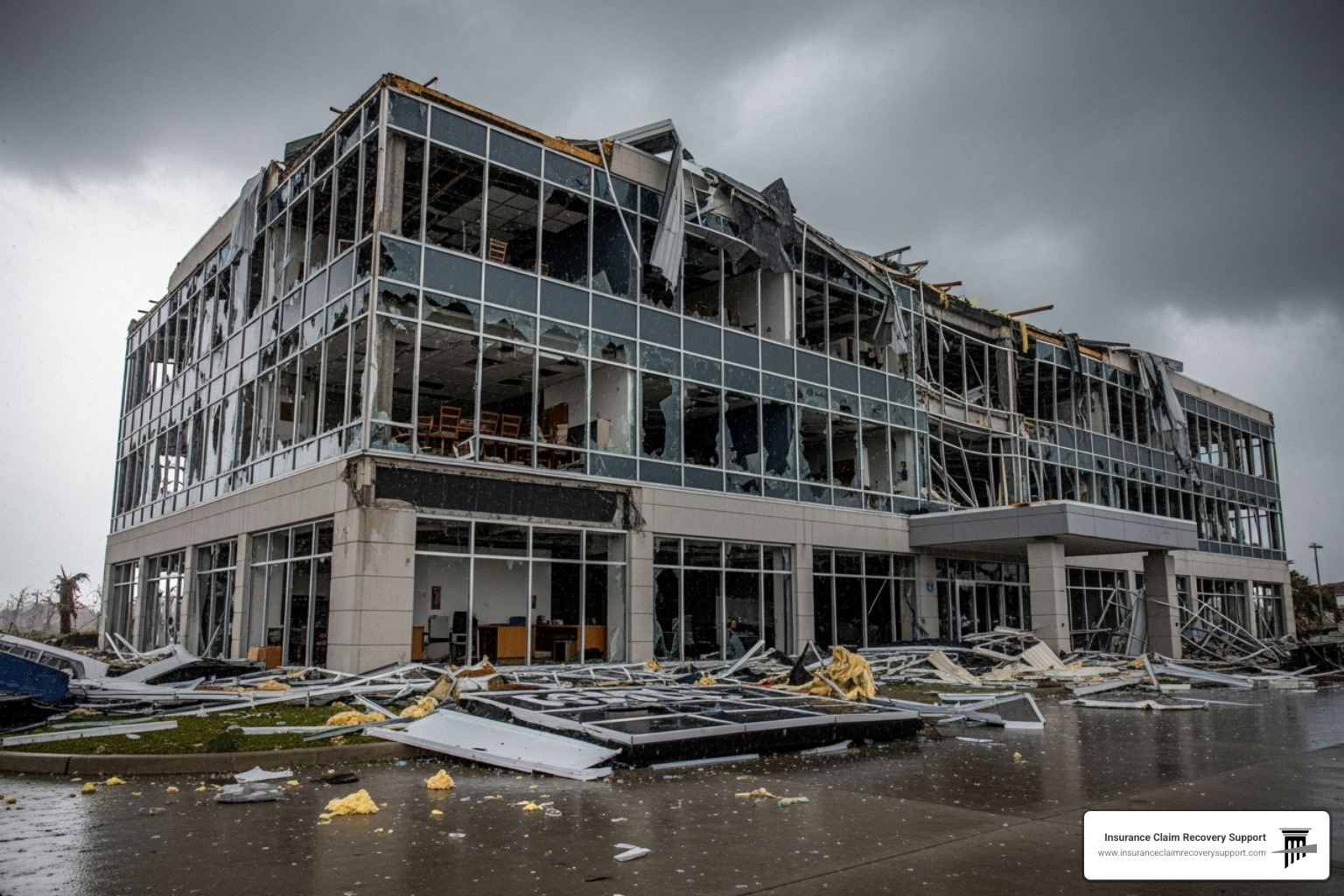How to become a commercial claims adjuster is a question that many property owners and real estate investors may find themselves asking, especially when faced with the complexities of insurance claims involving commercial properties. To break it down quickly:
-
Educational Requirements: At least a high school diploma is needed, but an associate’s or bachelor’s degree in business or a related field can be beneficial.
-
Licensing: Complete a pre-license course and pass the licensing exam as required by your state—Texas, for example, offers an All Lines Adjuster License.
-
Skill Development: Hone essential skills like investigation, communication, and negotiation.
-
Continuing Education: Complete ongoing education to maintain licensure.
-
Experience: Entry-level positions or apprenticeships play a crucial role in gaining practical experience and industry connections.
As vital players in the insurance industry, commercial claims adjusters assess damages and manage claims for properties affected by events like fires, natural disasters, or floods. Their role ensures that property owners, including multifamily complexes, retail centers, and industries, receive fair settlements from insurers.
I’m Scott Friedson, CEO of a major claims adjusting firm, where I’ve overseen and increased claims dramatically. My decades of experience reveal the importance of understanding how to become a commercial claims adjuster to safeguard your investments and avoid unnecessary disputes.
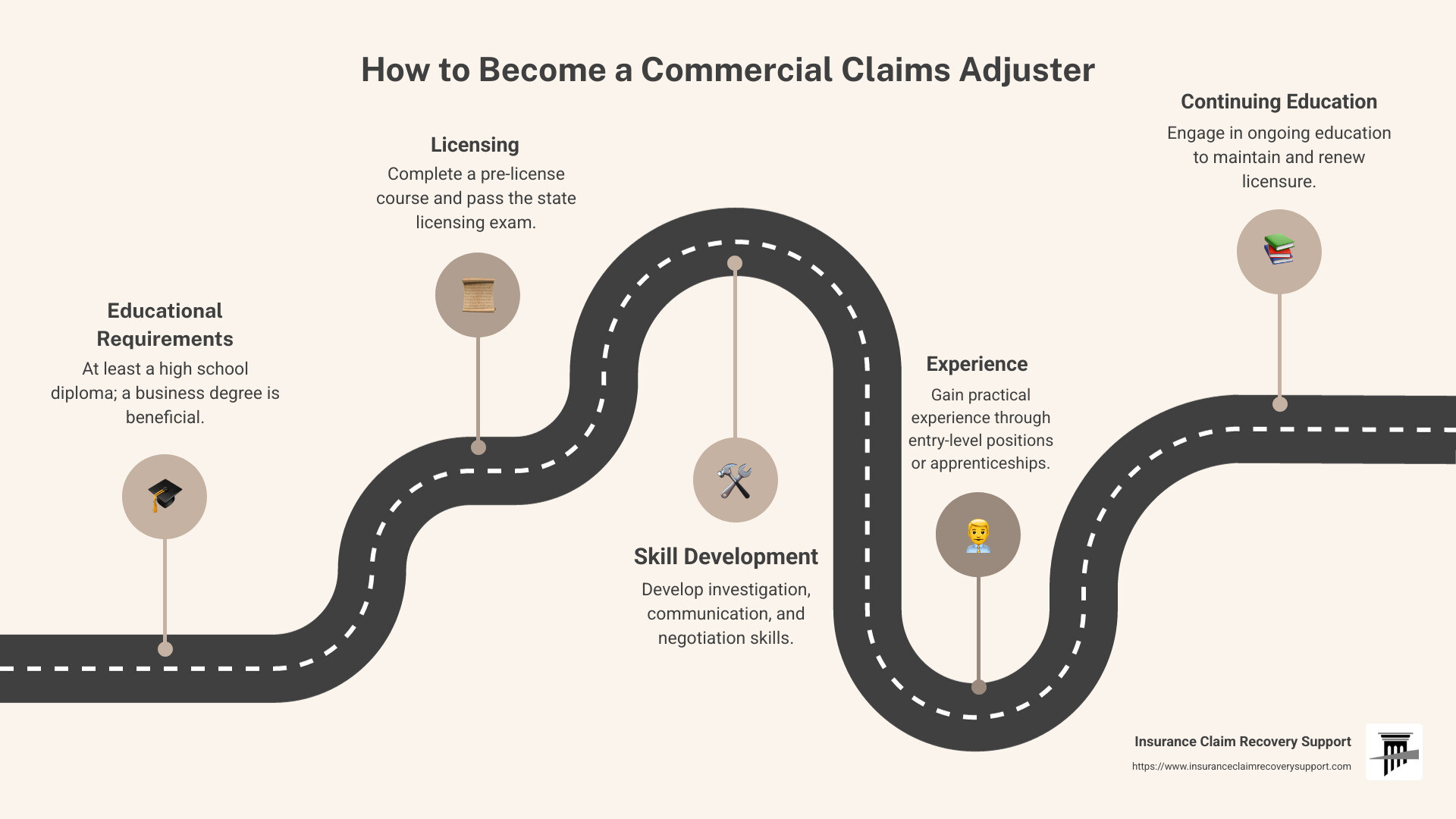
Understanding the Role of a Commercial Claims Adjuster
Commercial claims adjusters are crucial in the insurance industry. They assess and manage claims for commercial properties, ensuring fair settlements for property owners. Let’s explore their main responsibilities.
Job Duties
A commercial claims adjuster investigates insurance claims to determine the extent of an insurance company’s liability. They handle claims involving damage to properties like office buildings, retail spaces, and industrial facilities. Their tasks include:
-
Inspecting Damage: Adjusters visit sites to assess damage firsthand. This could involve anything from evaluating fire damage to inspecting flood-affected areas.
-
Gathering Information: They collect essential details like police reports, witness statements, and photos to build a complete picture of the claim.
-
Calculating Settlements: Adjusters estimate the cost of repairs or replacements. They ensure every payout is justified under policy terms.
-
Negotiating Settlements: They work with property owners and insurance companies to agree on fair compensation.
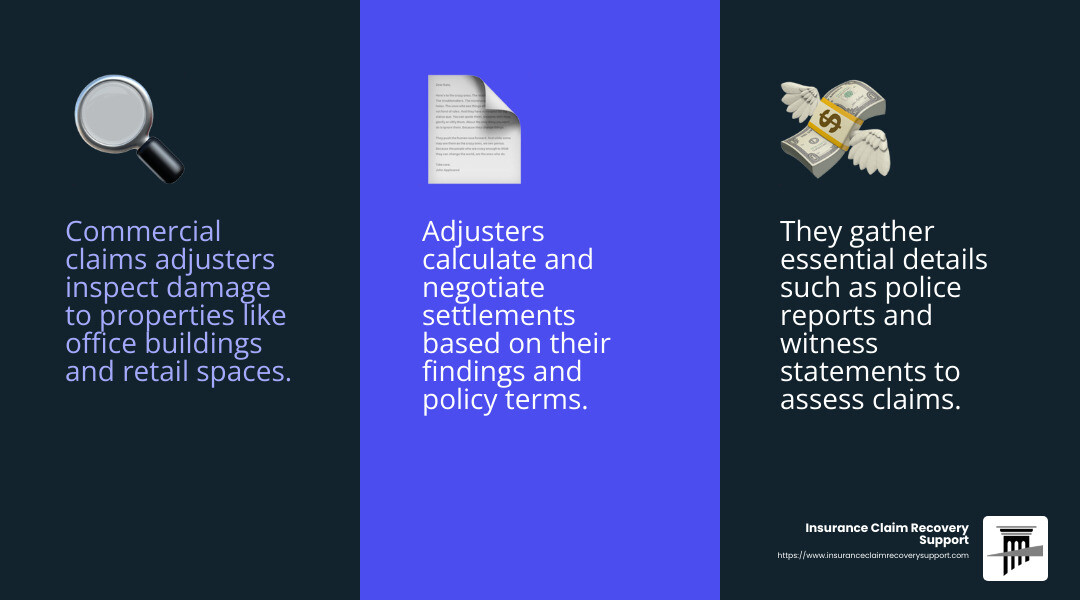
Liability
Determining liability is a key part of an adjuster’s job. They assess who is at fault and how much the insurance company should pay. This involves:
-
Evaluating Coverage: Adjusters check if the claim falls within the policy’s terms. They ensure that the insurance company only pays for covered damages.
-
Documenting Findings: They prepare detailed reports outlining their findings and recommendations for settlement amounts.
Insurance Claims
Handling insurance claims is at the heart of what adjusters do. They represent the insurance company, ensuring claims are processed fairly and correctly. However, their primary loyalty is to their employer, which means balancing the interests of both the company and the policyholder.
-
Reviewing Policies: Adjusters review insurance policies to understand coverage limits and exclusions.
-
Ensuring Accuracy: They verify that all claim details are correct and justified, protecting the insurance company from overpaying.
In summary, commercial claims adjusters play a vital role in the insurance process. They ensure that property owners receive fair compensation while safeguarding the interests of the insurance company. This balance requires strong analytical skills, effective communication, and attention to detail.
Next, we’ll explore the steps to enter the commercial claims field, including preparing for the licensing exam and gaining experience.
How to Become a Commercial Claims Adjuster
Becoming a commercial claims adjuster requires a mix of education, skills, and licensing. Here’s how you can get started on this career path.
Licensing and Certification
To work as a commercial claims adjuster, you need a license. The process usually involves:
-
Licensing Exam: Most states require you to pass a licensing exam. This exam tests your knowledge of insurance laws and practices. In Texas, for example, the All Lines Adjuster License is a common requirement.
-
Pearson Vue: This is a popular licensing vendor that administers these exams. You’ll need to register and schedule your exam through their platform.
-
Continuing Education: Once licensed, you must complete continuing education to keep your license active. This ensures you stay updated with industry changes and regulations.
Educational Background and Skills
While a college degree isn’t always necessary, it can be beneficial. Here are some educational paths and skills that can help:
-
Degree Requirements: A degree in business, law enforcement, or a related field can be advantageous. These programs often cover topics like risk management and investigative methods.
-
Investigative Skills: Strong investigative skills are crucial. You’ll need to gather and analyze information to assess claims accurately. This includes inspecting damage, reviewing reports, and interviewing witnesses.
-
Law Enforcement Background: Experience in law enforcement can be a plus. The skills developed in this field, such as attention to detail and critical thinking, are valuable in claims adjusting.
Gaining Experience and Networking
Once you have the necessary education and license, gaining experience is key.
-
Entry-Level Positions: Look for entry-level roles to start. These positions provide hands-on experience and help you learn the ins and outs of the industry.
-
Networking: Building connections in the industry can open doors to job opportunities. Attend industry events and join professional organizations to meet other professionals and learn from their experiences.
By following these steps, you’ll be well on your way to becoming a successful commercial claims adjuster. Next, we’ll discuss how to prepare for the licensing exam and the resources available to help you succeed.
Steps to Enter the Commercial Claims Field
Becoming a commercial claims adjuster involves several critical steps, from preparing for the licensing exam to gaining experience in the field. Here’s how you can steer this process effectively.
Preparing for the Licensing Exam
The licensing exam is a crucial step in becoming a commercial claims adjuster. Here’s how to get ready:
-
Understand the Exam Structure: Familiarize yourself with the types of questions and topics covered. The exam typically tests your knowledge of insurance laws, regulations, and claims procedures.
-
Study Resources: Use study guides, online courses, and practice exams to prepare. Look for reputable resources that offer comprehensive materials to help you get ready for the test.
-
Create a Study Schedule: Allocate specific times for studying each week. Consistency is key to retaining the information needed to pass the exam.
-
Join Study Groups: Connecting with others preparing for the exam can provide support and additional insights. Sharing knowledge and tips can be beneficial.
Gaining Experience and Networking
After obtaining your license, gaining practical experience and building a network are essential steps.
-
Entry-Level Positions: Start by applying for entry-level roles in insurance companies or independent adjusting firms. Positions like claims assistant or junior adjuster offer valuable on-the-job training.
-
Internships: If possible, seek out internships or volunteer opportunities. These positions can provide a real-world understanding of the claims process and improve your resume.
-
Industry Connections: Networking is vital in this field. Attend industry conferences, seminars, and workshops. Joining professional organizations can help you meet experienced professionals.
-
Mentorship: Find a mentor who is an experienced adjuster. They can offer guidance, share their knowledge, and help you steer the challenges of the job.
By following these steps, you’ll be well-equipped to enter the commercial claims field and build a successful career. Next, we’ll explore career advancement opportunities and specialization paths within the industry.
Career Advancement and Specialization
Once you’re established as a commercial claims adjuster, there are plenty of ways to advance your career and specialize in areas that interest you. Let’s explore some key paths for growth.
Professional Development
One effective way to improve your career is by pursuing professional development opportunities that enhance your skills in handling various types of claims. Engaging in continuous learning and training can significantly boost your expertise and value in the insurance industry.
Consider enrolling in courses or workshops that focus on the claims process, which can provide a deeper understanding and make you more valuable to employers. This commitment to learning can set you apart and open doors to advanced positions.
Specialized Training
Beyond general professional development, consider pursuing specialized training in specific types of claims, such as property, liability, or workers’ compensation. Each area requires unique skills and knowledge, and specialization can lead to roles with more responsibility and higher pay.
For example, if you’re interested in property claims, you might focus on learning about evaluating property damage and understanding property coverages. This specialized knowledge can set you apart in the field and open doors to advanced positions.
Career Growth
Career growth in the commercial claims field often involves moving into supervisory or managerial roles. As you gain experience and build your reputation, you might oversee a team of adjusters or manage complex claims.
Networking and continuing education are crucial for career growth. Attend industry events, join professional organizations, and stay updated with the latest trends and technologies in the insurance industry. This proactive approach will keep you ahead and ready for advancement opportunities.
In summary, advancing your career as a commercial claims adjuster involves engaging in professional development, pursuing specialized training, and continuously seeking growth opportunities. By investing in your professional development, you’ll be well-prepared for a successful and rewarding career in the insurance industry.
Frequently Asked Questions about Becoming a Commercial Claims Adjuster
What type of claims adjuster makes the most money?
When it comes to earning potential, not all claims adjusters are equal. Generally, catastrophe adjusters, who often work on large-scale natural disaster claims, tend to earn the most. These roles can be high-pressure and require quick response times, but they offer lucrative pay due to the urgent need for expertise during crises.
According to the research, the annual wage range for claims adjusters varies significantly, with some earning as much as $156,884. Those who specialize in complex commercial claims or have advanced certifications like the AIC designation often find themselves in higher-paying roles.
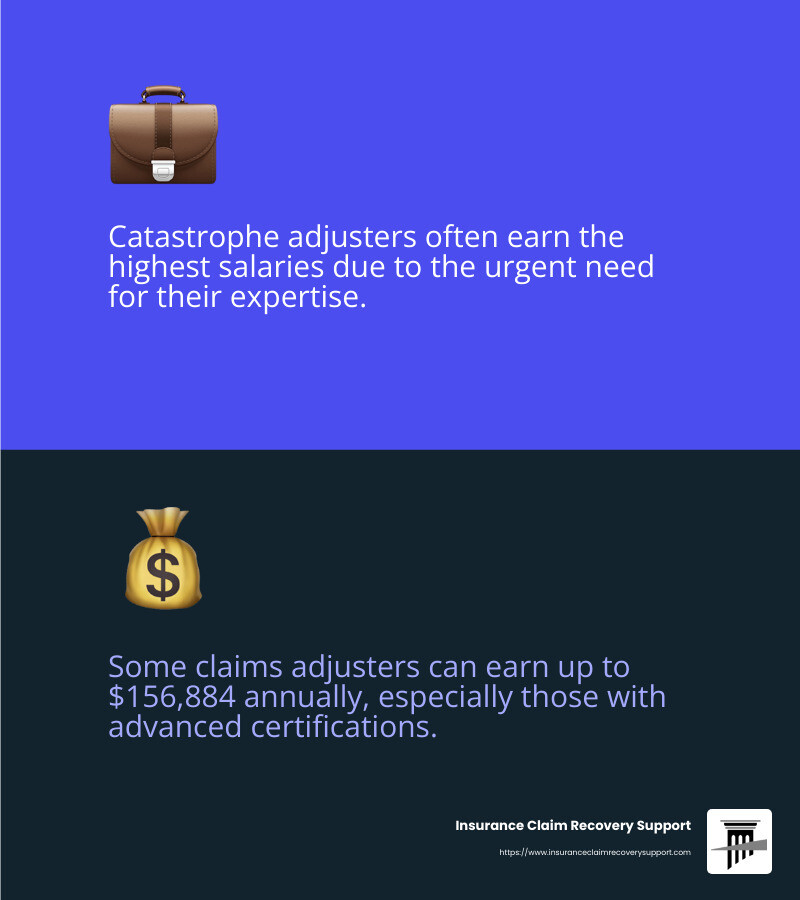
How to get into commercial claims?
The process of getting into commercial claims involves several steps, starting with the licensing process. Most states require claims adjusters to be licensed, and this typically involves passing a state-specific exam. For instance, in Texas, you need to complete a 48-hour course and pass an examination for the All Lines Adjuster License.
Application steps include:
-
Complete Required Education: While not always mandatory, a background in business or law enforcement can be beneficial.
-
Prepare for the Licensing Exam: Use study resources and consider continuing education courses to ensure you pass the exam.
-
Gain Experience: Entry-level positions or internships can provide the necessary experience and help you build industry connections.
-
Network: Join professional organizations and attend industry events to meet others in the field.
Once licensed, applying for positions at insurance companies or independent adjusting firms is the next step. Building a professional network can also help you find job opportunities within the commercial claims field.
Does Maine require an adjuster license?
Yes, Maine requires claims adjusters to hold a valid license. Each state has its own state requirements for licensure, so it’s important to understand the specific process for Maine if you’re planning to work there.
In Maine, the process generally involves:
-
Completing a Pre-Licensing Course: This is often a prerequisite before taking the licensing exam.
-
Passing the State Exam: After completing the course, you must pass the state licensing exam to become a licensed adjuster.
-
Continuing Education: Once licensed, adjusters must complete continuing education to maintain their license.
It’s crucial to check with the Maine Department of Insurance for the most current requirements and ensure you meet all the criteria before practicing as a claims adjuster in the state.
In conclusion, understanding the salary potential, licensing process, and state-specific requirements are key to successfully entering and advancing in the commercial claims adjuster field.
Conclusion
At Insurance Claim Recovery Support, we are dedicated to standing by policyholders through every step of the insurance claims process. Our mission is to ensure that you receive the maximum settlement you deserve, especially in the wake of property damage caused by events like fire, tornadoes, or hurricanes. We exclusively represent policyholders, advocating for them with a commitment to fairness and transparency.
Operating primarily in Texas, we have a deep understanding of the unique challenges faced by property owners in cities like Austin, Dallas, Fort Worth, San Antonio, and Houston. Our expertise in Texas’ severe weather patterns allows us to steer complex claims efficiently, ensuring our clients in Lubbock, San Angelo, Waco, Round Rock, Georgetown, and Lakeway are well-supported.
Choosing us means choosing a partner who is not only knowledgeable but also passionate about your recovery journey. We are here to make sure you are not alone in dealing with the aftermath of a storm or other disaster. Our commitment to policyholder advocacy is unwavering, and we are proud to serve clients nationwide from our Texas locations.
For more information on how we can assist you with your commercial property claims, visit our Commercial Property Public Insurance Adjusters page. Let us help you steer the path to recovery, ensuring you achieve the best possible outcome.


